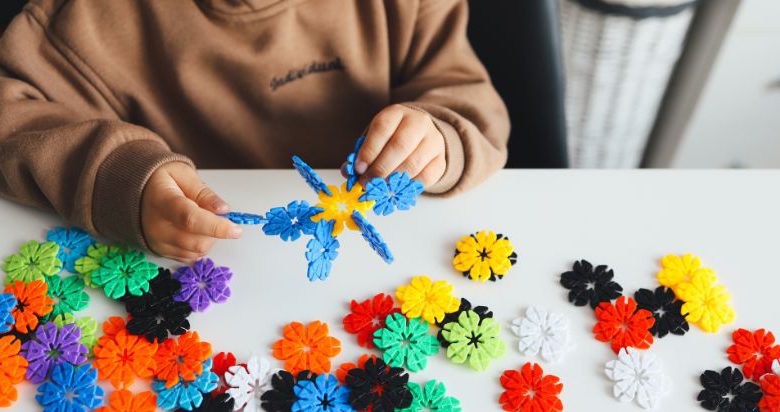Incorporating Fine Motor Skills into Daily Routines

Incorporating Fine Motor Skills into Daily Routines
So, what exactly are fine motor skills? They are all about the precise movements in the hands, fingers, and wrists. These skills are essential for tasks like writing, buttoning clothes, using utensils, and tying shoelaces. By incorporating fine motor skills into our daily routines, we can help children develop coordination, dexterity, and hand-eye coordination.
Why are these skills so important? Well, they play a significant role in a child’s overall development. Strong fine motor skills enable children to take care of themselves and excel in school. These skills enable them to hold a pencil, manipulate objects, and tackle tasks that require precision and concentration.
Children begin developing these skills from the moment they are born. As they grow, activities like stacking blocks, stringing beads, and using scissors help them improve further. Regular practice strengthens their hand muscles and enhances these skills.
However, sometimes children face challenges in developing fine motor skills. Difficulties with handwriting, using utensils, tying shoelaces, or fastening buttons can affect their confidence and participation in daily activities. But fret not! There are plenty of strategies and activities that can be incorporated into their daily routines to support and improve their fine motor skills.
Engaging Activities to Boost Fine Motor Skills
It is crucial to incorporate fine motor skills into our daily routines to help children grow and learn. Let’s explore some fantastic activities that can enhance their dexterity and coordination:
Using utensils and opening containers: Encourage your child to use spoons and forks during meals. This practice helps them refine their fine motor skills and become more independent. Let them open containers like jars or snack bags, which require finger strength and coordination.
Buttoning and fastening clothes: Getting dressed and undressed provides an excellent opportunity to work on fine motor skills. Teach your child to button shirts, zip jackets, and fasten snaps. This helps improve hand-eye coordination and finger dexterity.
Tidying up and wiping spills: Turn tidying up into a fun activity! Ask your child to pick up toys or organize their belongings. This helps develop their fine motor skills and teaches them responsibility. Involve them in wiping up spills using a cloth or paper towel, which requires precision and control.
Drawing and coloring: Bring out the drawing and coloring materials like crayons, markers, or colored pencils. Encourage your child to draw shapes, trace lines, or color within the lines. This boosts their hand-eye coordination, grip strength, and control over those small movements.
Puzzles and building blocks: It’s time for some puzzle fun! Introduce puzzles and building blocks during playtime. These activities demand careful manipulation and coordination, improving fine motor skills. Start with easy puzzles and gradually increase the difficulty level as your child progresses.
By incorporating these activities to improve fine motor skills into your child’s routine, you support the development of their fine motor skills. Remember to make it enjoyable and exciting so they can learn and grow while having a great time!
Fine Motor Skills and Playtime
Playtime presents the perfect opportunity to develop and enhance fine motor skills. These skills involve coordinating the small muscles in the hands and fingers. They are crucial for activities like writing, drawing, and buttoning clothes. So, let’s amp up the fun and incorporate fine motor activities into playtime!
Sensory play: Set up a sensory bin with materials like rice, sand, or water beads. Encourage your child to scoop, pour, and play with these materials using tools like spoons, cups, or tweezers. This type of play engages their senses and improves hand-eye coordination and finger dexterity.
Playing with playdough: Get ready for some squishy fun! Rolling, pinching, and shaping playdough helps strengthen hand and finger muscles. Provide your child with various tools like cookie cutters, plastic knives, or rolling pins to explore different techniques and shapes.
Stringing beads and lacing activities: Grab some beads and a string or shoelace, and let your child unleash their creativity! Encourage them to thread the beads onto the string. This activity enhances hand-eye coordination, finger strength, and precision. As they improve, you can introduce more complex patterns or different types of beads to keep things interesting.
Sorting and manipulating small objects: Let’s get sorting! Use items like buttons, pom-poms, or small blocks, and ask your child to sort them by color, shape, or size. This activity enhances fine motor skills and cognitive abilities like categorization and problem-solving.
Fun games and toys: Look for games that involve stacking blocks, solving puzzles, or using tweezers to pick up small objects. These activities engage fine motor skills while promoting problem-solving, hand-eye coordination, and concentration.
By incorporating these activities to strengthen fine motor skills during playtime, you create a fun and educational experience that supports overall development. Remember to choose activities that are appropriate for your child’s age and always supervise them for safety and enjoyment.
Fine Motor Skills in the Classroom
Developing fine motor skills significantly contributes to a child’s overall development. These skills involve the small muscles in the hands, fingers, and wrists, which are essential for everyday activities like writing, cutting, and buttoning clothes. Teachers can implement various strategies in the classroom to promote and enhance these skills.
Group activities: Let’s involve everyone! Incorporate fine motor activities into group settings. Activities that require precise hand-eye coordination and finger dexterity, such as stringing beads, building with blocks, or playing with playdough, can be done together. This helps improve fine motor skills while fostering social and teamwork abilities.
Lesson integration: Spice up your lesson plans by integrating fine motor practice. Include activities like coloring, drawing, or cutting in different subjects. For example, during a science lesson about plants, students can practice fine motor skills by cutting out and pasting different parts of a plant. This reinforces their learning and enhances their fine motor abilities.
Assessing progress: Keep track of your students’ progress! Use assessment tools like checklists or observation charts to evaluate their fine motor skills. By identifying strengths and areas for improvement, you can provide targeted support and tailor activities to meet each student’s needs.
Supporting Fine Motor Skills at Home
Supporting the development of fine motor skills is crucial for a child’s growth and independence. By incorporating fine motor activities into daily routines, parents and caregivers can create an environment that promotes skill development and encourages independence in self-care tasks.
Creating a fine motor-friendly environment: Ensure you have age-appropriate toys and materials that require manipulation and precision. Think puzzles, building blocks, playdough, and art supplies. These items strengthen hand muscles and improve dexterity. Keep them organized in easily accessible spaces to encourage engagement in fine motor activities.
Incorporating activities into daily routines: Mealtime offers a perfect opportunity to engage fine motor skills. Encourage your child to use utensils or practice pouring liquids from a small pitcher into a cup. This refines hand-eye coordination and promotes finger strength and control.
Household chores: Transform everyday tasks into fine motor practice! Sorting laundry, folding clothes, or buttoning shirts provide excellent opportunities to refine fine motor skills. Start with simple tasks and gradually increase the complexity as your child’s skills improve.
Encouraging independence in self-care tasks: It’s time to let your child shine! Encourage them to dress themselves, brush their teeth, or tie their shoes. These activities require fine motor coordination and build confidence and self-esteem.
By creating a fine motor-friendly environment, incorporating specific activities into daily routines, and encouraging independence in self-care tasks, you effectively support the development of fine motor skills. Remember to make these activities enjoyable and exciting, allowing children to explore, learn, and grow at their own pace.
Fine Motor Skills and Child Development
Fine motor skills play a significant role in a child’s overall development. They involve using the small muscles in the hands, fingers, and wrists, enabling children to perform tasks with precision and control. From buttoning a shirt to holding a pencil, fine motor skills are essential for everyday activities and academic success.
It is important to recognize signs of fine motor delay. Difficulties with tasks requiring hand-eye coordination, such as tying shoelaces or using scissors, may indicate a delay. Children with fine motor delays may also struggle with handwriting, manipulating small objects, or completing puzzles.
If a child shows signs of fine motor delay, working with occupational therapists can make a significant difference. These professionals specialize in assessing and treating fine motor difficulties. They provide individualized interventions and activities to help children improve their fine motor skills and overcome challenges.
Collaboration between home and school is key when it comes to supporting a child’s development. By incorporating fine motor activities into daily routines, we create opportunities for practice and improvement. Simple tasks like pouring water, stringing beads, or cutting paper enhance fine motor skills while engaging children in fun and meaningful activities.
Here at Little Sunshine’s Playhouse, we understand the importance of incorporating fine motor skills into daily routines. Our products are designed to promote and enhance these skills through interactive play. From stacking blocks to threading toys, our range of toys and games are carefully crafted to engage children in activities that strengthen their fine motor abilities.
To read more about fine motor skills, check out the following articles:
Developing Fine Motor Skills: Fun and Educational Activities for Preschoolers
Fine Motor Skills Developmental Milestones





